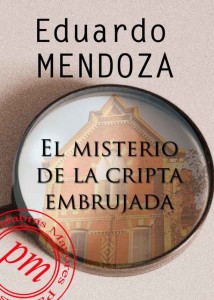Eurolis Online Seminar 2020: How can libraries play a positive role in crisis?
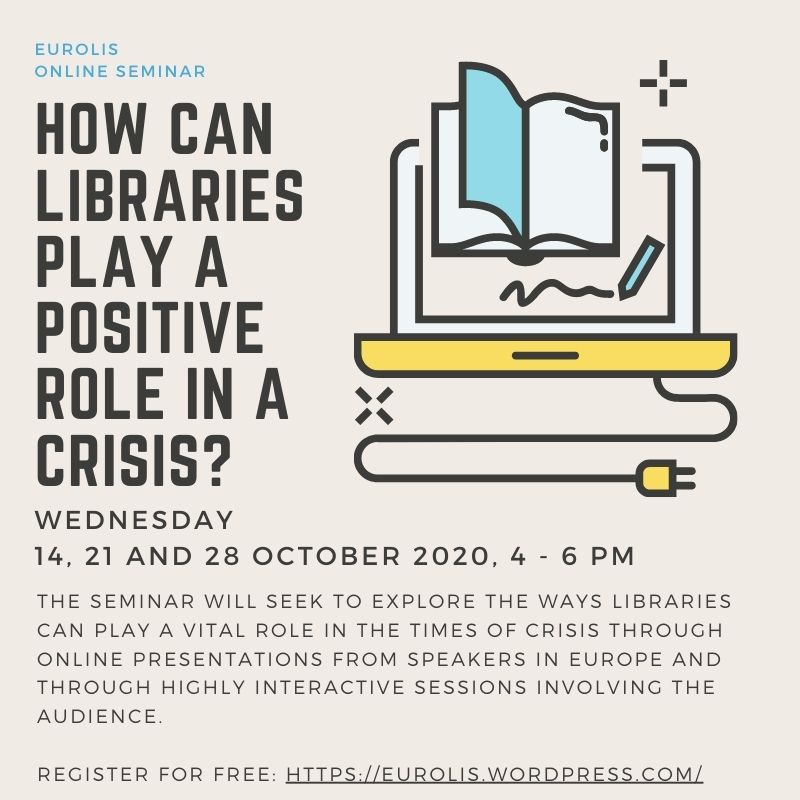
An online conference held over 3 weeks
Wednesdays 14, 21 and 28 October 2020, from 4 to 6pm
Choose your slot(s) & register for free
The seminar will seek to explore the ways libraries can play a vital role in the times of crisis through online presentations from speakers in Europe and through highly interactive sessions involving the audience.
The breadth of the chosen topic is expected to cover the themes of health epidemic, environmental issues/catastrophe or socio-economic/wartime crisis involving the migration or subjugation of large numbers of people and the role a library or group of libraries has played in alleviating the situation.
Spanish Speaker | For What Kinds of Crises are Libraries Useful for? by Lluis Anglada, as part of the SESSION 2| Wednesday 21st Octobre | 4.00pm (GMT) REGISTER
We will examine the measures taken by Spanish libraries in the recent Covid-19 crisis and also those taken in the 2008 economic crisis. In these cases, but also in environmental catastrophes, libraries can help, but this is not their role.
What does crisis mean? There are different kinds of crises; these can be big or small, short-term or long-term and often they will not affect all people in the same way.
In confusing and troubling times, libraries have to re-examine why they were created; as spaces where the public could access information. Meanwhile, this necessity for libraries is disappearing given the accelerated change of society where information can be distributed rapidly across the globe.
Globalisation and sustainability are new challenges (or crises) that people have to cope with. Are these challenges related in some way to the function of a library?
In the talk, we will try to characterise what kind of crises libraries are facing and how libraries and librarians have to react in order to continue being useful and relevant.

Lluís Anglada, currently is Director of Open Science in the CSUC (Consortium of Services for the Universities of Catalonia); Previously, he was the director of the CBUC (Consortium of Catalan Academic Libraries) and director of the Catalonia Technical University Libraries. He has been a member of several professional boards at the national and international level (SPARC Europe, LIBER, OCLC’s Global Council) and also of publisher advisory councils (ProQuest, Wiley, Nature…) He has published about 40 articles and book chapters. Founder of the blogs BDig y Blok de Bid.
For more information, please visit:
Apertura de la Biblioteca Reina Sofía

¡Regresa la Biblioteca del Instituto Cervantes de Londres a partir del jueves, 20 de agosto! Nuestro horario será los martes y los jueves, de 11:00 a 15:00 horas, y solo estará disponible el servicio de préstamo y devolución con cita previa.
Para poder hacerlo tendrás que enviar un correo a biblon@cervantes.es y biblon1@cervantes.es. También tendrás que reservar los documentos que te quieras llevar prestados. Para ello, puedes consultar el catálogo y hacer la reserva usando tu usuario /contraseña o enviándonos un correo.
Recuerda que solo podrá acceder un adulto de cada vez a la biblioteca, los menores de quince años sólo podrán acceder acompañados de un adulto, además usa gel hidroalcohólico, respeta la distancia social y trae tu mascarilla.
Muchas gracias por su colaboración y comprensión,
Biblioteca Reina Sofía
Reina Sofia Library’s reopening

| Instituto Cervantes in London’s library is back from Thursday, August 20th! Our schedule will be Tuesdays and Thuradays, from 11am to 3pm. The Click & Collect service offers the opportunity to order documents online to pick up in person and return them. Please, kindly make an appointment via email at biblon@cervantes.es and biblon1@cervantes.es, and order your documents ahead of your visit. Browse the catalogue and reserve them via your library account or by email. Kindly remember that only one adult at a time can enter the library, children (under 15) must be accompanied at all times, please use hand gel in our premises, respect social distancing measures and use face masks. Thank you very much for your help and understanding, Reina Sofía Library |
The most popular DVDs in our library
A very important part of Instituto Cervantes in London is our library and the movies available to borrow in DVD. We introduce in this post a selection of the most popular ones among our users:
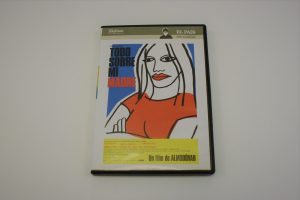
All About My Mother is a film by Pedro Almodóvar. A Greek saying states that only women who have washed their eyes with tears can see clearly. This saying does not hold true for Manuela. The night a car ran over her son Esteban, Manuela cried until her eyes ran completely dry. Far from seeing clearly, the present and the future become mixed up in darkness.
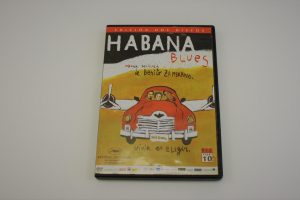
Havana Blues is a 2005 Spanish and Cuban film by Benito Zambrano, which tells the story of two young musicians in Cuba. The film revolves around their music and contains criticism of problems in Cuba such as poverty and electricity outages.
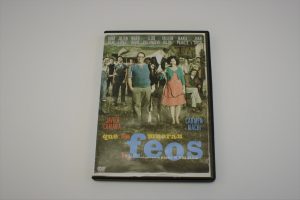
To Hell With The Ugly is a film by Nacho Garcia Velilla. Eliseo (Javier Cámara) is ugly, lame and single. He still hasn’t found the woman of his dreams and he doesn’t really know what love is. Nati (Carmen Machi) is similarly ugly and is currently separated. She’s just met the man of her dreams but she doesn’t know what real love is either. Eliseo, on the other hand, fears that the worst is just around the corner, whilst Nati fantasises that the best is yet to come.
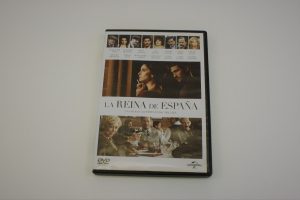
The Queen of Spain is a film by Fernando Trueba. Eighteen years after fleeing Nazi Germany, Spanish film actress Macarena Granada becomes a major Hollywood star. She returns to Spain to play Isabella I of Castille, surrounded by showbiz hype.
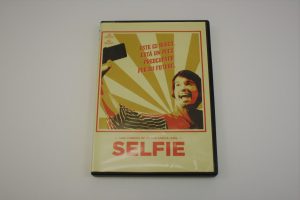
Selfie is a movie by Víctor García León. A privileged young man in Madrid gets a reality check when his father is arrested on corruption charges and all of the family’s assets are seized.

Skins is a film by Eduardo Casanova. Deformed, disfigured characters must find a way to deal with society shunning their differences.
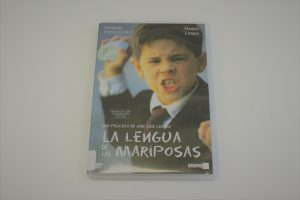
Butterfly’s Tongue is a film by José Luis Cuerda. The heartwarming story of the relationship that develops between a shy young boy and his kind teacher in 1936 Spain. The boy, Moncho, is frightened about starting school, and it is up to the gentle, compassionate Don Gregorio to set the boy’s mind at ease. When the Spanish Civil War erupts, both individuals’ lives are changed forever.
Los DVD más populares de nuestra biblioteca
Una parte muy importante de la biblioteca del Instituto Cervantes en Londres es la sección de películas en DVD. Os presentamos una selección de las más prestadas y las más populares entre nuestros usuarios:

Todo sobre mi madre es una película de Pedro Almodóvar. Un dicho griego dice que solo las mujeres que se han lavado los ojos con lágrimas pueden ver con claridad. Este dicho no es válido para Manuela. La noche que un automóvil atropelló a su hijo Esteban, Manuela lloró hasta que sus ojos se secaron por completo. Lejos de ver claramente, el presente y el futuro se mezclan en la oscuridad.

Habana Blues es una película hispanocubana de 2005 de Benito Zambrano, que cuenta la historia de dos músicos jóvenes en Cuba. La película gira en torno a su música y contiene críticas a los problemas en Cuba, como la pobreza y los cortes de electricidad.

Qué se mueran los feos es una película de Nacho García Velilla. Eliseo (Javier Cámara) es feo, cojo y soltero. Todavía no ha encontrado a la mujer de sus sueños y realmente no sabe qué es el amor. Nati (Carmen Machi) es también fea y actualmente está separada. Acaba de conocer al hombre de sus sueños, pero tampoco sabe qué es el verdadero amor. Eliseo, por otro lado, teme que lo peor esté a la vuelta de la esquina, mientras que Nati fantasea con que lo mejor está por venir.

La Reina de España es una película de Fernando Trueba. Dieciocho años después de huir de la Alemania nazi, la actriz española Macarena Granada se convierte en una gran estrella de Hollywood. y regresa a España para interpretar a Isabel I de Castilla, rodeada de exageraciones publicitarias.

Selfie es una película de Víctor García León. Un joven privilegiado en Madrid recibe una verificación de la realidad cuando su padre es arrestado por cargos de corrupción y todos los bienes de la familia son incautados.

Pieles es una película de Eduardo Casanova. Los personajes deformados y desfigurados deben encontrar una manera de lidiar con la sociedad evitando sus diferencias.

La lengua de las mariposas es una película de José Luis Cuerda. La conmovedora historia de la relación que se desarrolla entre un niño tímido y su amable maestro en la España de 1936 . El niño, Moncho, tiene miedo de comenzar la escuela, y le corresponde al gentil y compasivo Don Gregorio tranquilizarlo. Cuando estalla la Guerra Civil española, las vidas de ambos individuos cambian para siempre
Libros para niños de 6 a 8 años (I) – Books for children from 6 to 8 years (I)
After having started school at 4, most children yearn to read on their own by the ages of 6 or 7. For this special time, we suggest a range of different books from our library:
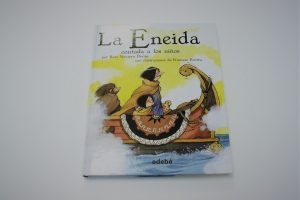
La Eneida Contada A Los Niños de la autora Rosa Navarro Duran y el ilustrador Francesc Rovira. La Eneida es un relato de aventuras, de amores y de guerras. Leyendo La Eneida podremos conmovernos con el dolor de la bellísima reina Dido cuando Eneas se marcha, sufrir por la suerte de las naves del troyano en medio de las tempestades, o asistir a su impresionante combate con el rey Turno. Veremos a Iris, dibujando su arco en el cielo cuando Juno la envía con sus mensajes perversos, porque fue esta poderosa diosa la gran enemiga de Eneas.
The Aeneid, as retold for Children by author Rosa Navarro Durán and illustrator Francesc Rovira. The Aeneid is a tale of adventures, love and war. Reading the Aeneid, we will be moved by the pain of the beautiful queen Dido when Aeneas departs, to suffer the fate of the Trojan vessels in the thick of the tempests, or to attend his incredible combat with king Turnus. We will see Iris, drawing her bow in the sky when Junus sends her his hateful messages, because this powerful goddess was Aeneas’ great enemy.
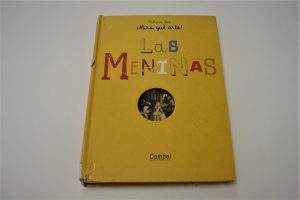
¡Mira que arte! Las Meninas (¡Mira qué arte!) de la autora e ilustradora Patricia Geis Conti. Es una colección de libros que combinan historia del arte con imágenes, espectaculares pop-ups y actividades divertidas para descubrir las obras más célebres de todos los tiempos. Después de La Mona Lisa, ponen al alcance de los pequeños uno de los cuadros más enigmáticos de la historia del arte: Las Meninas, de Velázquez.
Las Meninas by author and illustrator Patricia Geis Conti. It is a collection of books that combine art history with images, spectacular pop-ups and fun activities to discover the most famous works of all time. Our particular favourite comes after the Mona Lisa, and is one of the most enigmatic paintings in art history within reach of the little ones: Las Meninas, by Velázquez.
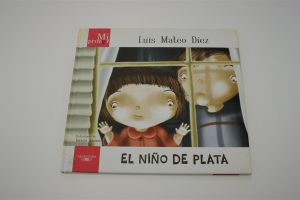
Mi Primer Luis Mateo Díez. El niño de plata. En la colección de literatura infantil «Mi primer» los grandes de la literatura se enfrentan al público más exigente… ¡los pequeños lectores!
My First by Luis Mateo Díez. The silver kid. In the collection of children’s literature called «My first» the greats of literature face the most demanding public … small readers!
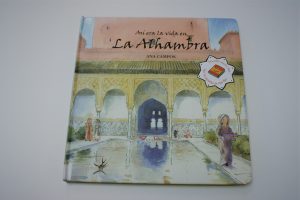
Así era la vida en la Alhambra de la autora Ana Campos. La Alhambra es una ciudad árabe medieval que ha llegado increíblemente bien conservada a nuestros días. Este libro ayudará a comprender cómo era la vida en la Alhambra en el siglo XIV. Descubre como era el interior de las torres o los cuartos de baño. Sumérgete en una cultura antigua que nos ha dejado un legado único.
That was life in the Alhambra by author Ana Campos. The Alhambra is a medieval Arab city that is still incredibly well preserved today. This book will help children to understand what life was like in the Alhambra in the fourteenth century. Discover what the interiors of the towers or even the bathrooms were like… Immerse yourself in an ancient culture that has left us a unique legacy.
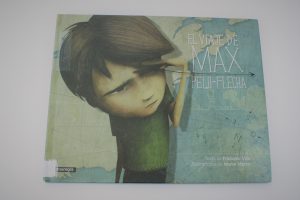
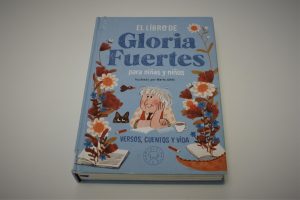
El libro de Gloria Fuertes para niñas y niños de Gloria Fuertes, con el escritor Jorge Cascante y la ilustradora Marta Altés. Esta edición única profusamente ilustrada por Marta Altés, nuestra ilustradora de mayor proyección internacional, incluye: – Un prologo escrito por Gloria Fuertes a mediados de los 80 para una antología que jamás se publicó. – Cartas de las niñas y niños que Gloria recibió a lo largo de los años en su buzón. – Una carta abierta a todos los maestros firmada por la poeta. – Una selección de algunos de los poemas escritos por las niñas y niños que participaron en el Premio de Poesía Infantil Gloria Fuertes a lo largo de todas sus ediciones.
The Book of Gloria Fuertes for girls and boys by Gloria Fuertes, plus writer Jorge Cascante and illustrator Marta Altés. This unique edition, bountifully illustrated by Marta Altés, our illustrator with the greatest international projection, includes: – A foreword written by Gloria Fuertes in the mid-80s for an anthology that was never published. – Letters from the girls and boys Gloria received over the years in her mailbox. – An open letter to all teachers signed by the poet. – A selection of some of the poems written by the girls and boys who participated in the Gloria Fuertes Children’s Poetry Prize throughout all its editions.
Horario de verano 2019 – 2019 Summer schedule

Please note that our Enrolment Office will be opened as follows from 19th July to 20th September 2019, both included:
- Monday to Thursday: 9.30 to 18.00
- Friday: 9.30 to 14.30
- Saturday: 10.00 to 14.00
- Sunday: Closed
Please do also take into account that our Library will be closed from 1st August to 24th August 2019, both included.
15-19 Devereux Court, London WC2R 3JJ
Tel. +44 (0)20 7201 0750
cenlon@cervantes.es
Nearest stations: Temple / Holborn
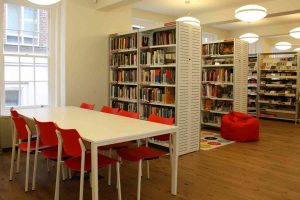
La secretaría permanecerá abierta desde el 19 de julio al 20 de septiembre de 2019, ambos incluidos, en el siguiente horario:
- Lunes a jueves: 9.30 – 18.00
- Viernes: 9.30 – 14.30
- Sábado: 10.00 – 14.00
- Domingo: cerrado
La biblioteca estará cerrada desde el 1 al 24 de agosto de 2019, ambos incluidos.
15-19 Devereux Court
London WC2R 3JJ
Tel.: +44 (0)207 201 0750
cenlon@cervantes.es
(Estaciones cercanas: Temple / Holborn)
Nueva tarea en el Club Virtual de Lectura – New Virtual Reading Club assignment
Les invitamos de nuevo a formar parte del Club Virtual de Lectura del Instituto Cervantes. ¡Disfrutará enormemente!
Se trata de un servicio que ofrece compartir opiniones con otros usuarios de bibliotecas del Instituto Cervantes de todo el mundo en torno a una obra de la literatura española o hispanoamericana a través de una plataforma de lectura en Internet, y que funciona de modo similar al de las redes sociales.
Requisitos:
-Dominio del español;
-Tener vigente el carné de biblioteca.
La próxima lectura será del 4 al 15 de mayo: «El misterio de la cripta embrujada», de Eduardo Mendoza
(del 4/5/2015 al 15/5/2015)
Para más información, consulte la normativa del Club Virtual de Lectura o escriba a club.virtual.lectura@cervantes.es.
¿Cómo inscribirme? Tutorial de acceso
____________________________________________________
We insist: come join the Instituto Cervantes Virtual Reading Club. You will enjoy tremendously!
The aim of this service is to provide an environment where you can share your views on a given Spanish or Latin American Literature title with other Instituto Cervantes library members across the world, via an Internet reading platform. It works in a similar way to social media networks.
Requirements to join:
-to be fluent in Spanish;
-to have a valid Instituto Cervantes Library card.
Next reading will take place 4 to 15 May: El Misterio De La Cripta Embrujada, by Eduardo Mendoza
(4/5/2015 – 15/5/2015)
For further information, please check the Virtual Club regulations or write to club.virtual.lectura@cervantes.es.
How to register? Tutorial
Nuevo Club Virtual de Lectura – New Virtual Reading Club
Estimados amigos:
Les invitamos de nuevo a formar parte del Club Virtual de Lectura del Instituto Cervantes.
Se trata de un servicio que ofrece compartir opiniones con otros usuarios de bibliotecas del Instituto Cervantes de todo el mundo en torno a una obra de la literatura española o hispanoamericana a través de una plataforma de lectura en Internet, y que funciona de modo similar al de las redes sociales.
Recuerde que los requisitos son tener dominio de español y tener vigente el carné de biblioteca.
La próxima lectura es en torno al siguiente libro:
La tregua / Mario Benedetti
(20/4/2015 – 30/4/2015)
Para más información, consulte la normativa del Club Virtual de Lectura o escriba a club.virtual.lectura@cervantes.es.
¿Cómo inscribirme? Tutorial de acceso
________________________________________
Dear friends,
We would like to invite you to join the Instituto Cervantes Virtual Reading Club.
The aim of this service is to enable you to share your views on a given Spanish or Latin American Literature title with members of Instituto Cervantes libraries across the world, via an Internet reading platform. It works in a similar way to social media networks.
Requirements to join are to be fluent in Spanish and to have a valid Instituto Cervantes Library card. Next reading will be on the following book:
La tregua / Mario Benedetti
(20/4/2015 – 30/4/2015)
For further information, please check our Virtual Club regulations or write to club.virtual.lectura@cervantes.es
